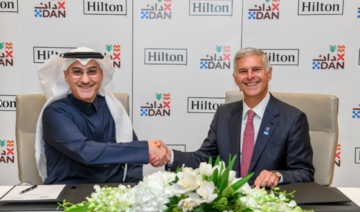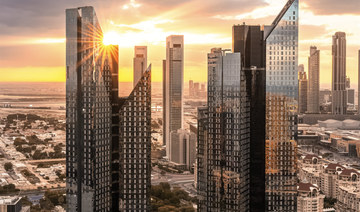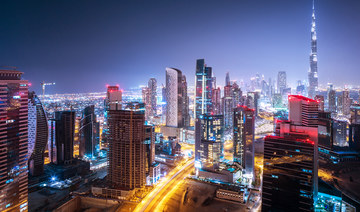RABAT: Morocco’s government said on Monday it would end economic cooperation with the European Union if the bloc does not honor a farming deal, weeks after an EU court ruled that trade accords do not apply to the disputed Western Sahara region.
In a statement to MAP state news agency, the agriculture ministry said the EU should resist any attempts to block Moroccan products entering into the European market but did not explain why the pact might be at risk.
“In the absence of a frank commitment from the European Union, Morocco will have to make a decisive choice whether to continue with EU trade or to undo it without looking back, and focus on building new trade routes,” the ministry said.
The European Court of Justice ruled in December that deals involving trade of agricultural products, processed agricultural products and fisheries between the EU and Morocco did not apply to Western Sahara.
The ruling was claimed as a victory by the Polisario group seeking independence for Western Sahara, which Morocco calls its own. Last month, Polisario sought to have the EU apply the ruling to block a shipment of fish oil to a French port from the territory.
Rabat had said the European court ruling would not impact current trade deals in any way. The agriculture ministry said on Monday that current agreements with EU ensured thousands of jobs and could trigger migrant flows if their implementation fails.
An EU diplomatic source told Reuters the ministry’s statement came after Energy Commissioner Miguel Arias Canete referred in a written reply to a question in the EU parliament to the “separate and distinct” status of Western Sahara.
Moroccan agriculture minister Aziz Akhannouch said Monday’s statement was not a response to Canete’s remarks, but that his comments reflected an attitude seen within EU institutions.
“It is about what the European court decision means,” the minister told Reuters by telephone. “For Morocco it means the deals should be implemented like they have been since their signature.”
Akhannouch said European officials have not yet started official talks on the meaning of the ruling but that Morocco has been preparing for its potential effects.
“We are reasonable people, we know that we need Europe and Europe needs us. But we want them to see all the efforts Morocco does to make the partnership work,” he said.
Without going into details of the trade deals, the court had signalled some EU fisheries in disputed coastal waters would be in violation of the ruling. It said agreements signed with Morocco could not include Western Saharan resources because the region’s inhabitants had not agreed to that.
Western Sahara, which has significant phosphate reserves and offshore fishing, has been contested since 1975 when Spain, the former colonial power, withdrew. Morocco fought a 16-year war with Polisario, which established a self-declared Sahrawi Arab Democratic Republic.
A 1991 cease-fire was meant to be followed by a UN-backed referendum on self-determination including the question of independence. The vote has never happened mainly because of disagreements on who could take part and Morocco since 2006 has promoted its own autonomy proposal.
The two sides often engage in diplomatic sparring but tensions on the ground have also increased since August last year, when UN peacekeepers were forced to deploy after Morocco forces and a Polisario unit faced off in a buffer zone between Morocco-controlled area and territory held by Polisario.
Last month, Morocco rejoined the African Union, having left decades ago because it had allowed Polisario recognition. Analysts expect Morocco to try use its position inside the AU to promote its own autonomy plan for Western Sahara against Polisario. (Reporting by Aziz El Yaakoubi)
Morocco threatens to cut EU ties if farm deal founders
Morocco threatens to cut EU ties if farm deal founders
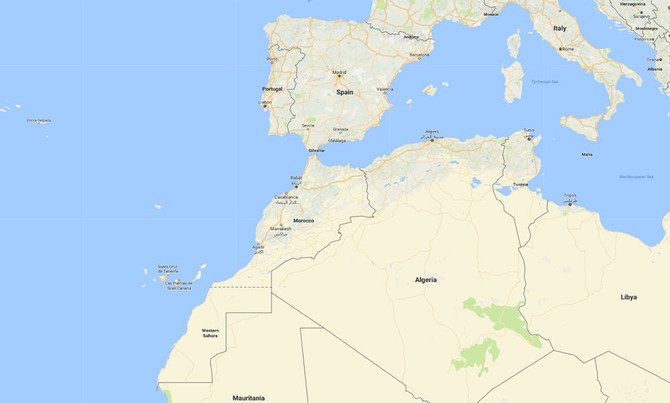
Hilton plans to quadruple its Saudi footprint, says top executive
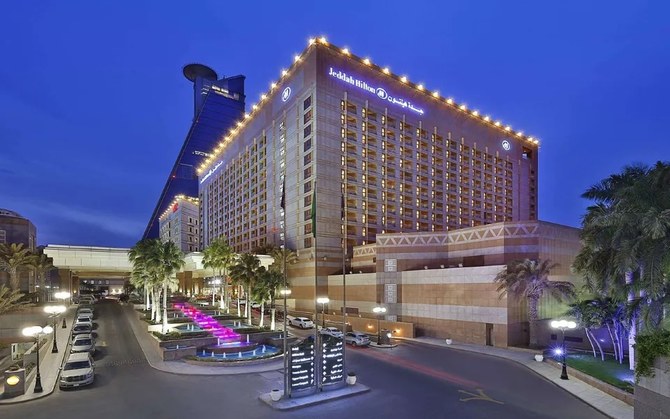
RIYADH: Saudi Arabia’s hospitality sector is growing by leaps and bounds with key global players entering the scene due to the business-friendly policies of the Kingdom announced as part of its economic diversification efforts.
Hospitality giant Hilton has announced plans to develop two hotels in Jeddah and Abha. According to a press statement, Hampton by Hilton Al Nuzhah in Jeddah will be developed in partnership with Al Manar United for Trading. Scheduled for opening in 2026, the hotel will feature 80 rooms.
The Hilton Garden Inn located in Abha is expected to open in 2027, it said.
The Abha hotel, also developed in partnership with Al Manar United for Trading will have 200 rooms, a lounge, a dining area, and a rooftop, as well as a gym and an outdoor pool.
Speaking to Arab News on the sidelines of the Future Hospitality Summit in Riyadh on Monday, Guy Hutchinson, president of Hilton in the Middle East and Africa region, said that the company plans to more than quadruple its Saudi footprint and open more than 60 hotels, with plans to exceed 100 properties in the coming years.
“As Saudi Arabia sets its target to increase hotel rooms to 550,000 by 2030, our pipeline of hotels will add more than 17,000 rooms in the coming years and we will introduce new brands to emerging and established destinations in Saudi Arabia,” said Hutchinson.
He added: “From focused service and branded residences to lifestyle and luxury, two-thirds of our pipeline is currently under construction and we remain committed to diversifying our portfolio to cater to diverse traveler needs.”
In partnership with master developer Knowledge Economic City, Hilton also signed an agreement for Hilton Residences Madinah Knowledge Economic City adjacent to Hilton Madinah Knowledge Economic City which is currently under construction.
The project in Madinah — set to open in 2026 — is expected to feature 64 two, three, and four-bedroom apartments.
“We are delighted to be working with master developer Knowledge Economic City to grow our footprint in Madinah. Knowledge Economic City is a very important project, playing a significant role in growing the city’s supply of modern and lifestyle destinations,” said Hutchinson.

Guy Hutchinson, president of Hilton in the Middle East and Africa.
He added: “We currently have Hilton Madinah Knowledge Economic City under construction, and the branded residences will provide guests with various choices of apartments and access to the hotel’s wide range of amenities, further contributing to destination accommodation offering.”
The press statement also added that Hilton Riyadh Olaya is expected to open its doors to guests in the coming months.
Carlos Khneisser, vice president, of development, Middle East and Africa at Hilton, said these new agreements will help meet the rising demand from travelers to Saudi Arabia as the Kingdom targets 150 million visitors by 2030.
“Saudi Arabia’s tourism landscape continues to evolve rapidly, presenting significant growth opportunities for Hilton and our valued partners. Two-thirds of our Saudi pipeline is currently under construction and we are working closely with investors to expand into new destinations with more of our brands,” said Khneisser.
During the talk, Hutchinson said that Hilton is committed to creating 15,000 jobs in the Kingdom by 2030, with more than half of the recruits being local talents.
“Our pipeline of hotels will create 15,000 job opportunities, with more than half of these recruits anticipated to be Saudi nationals. Over the past two years, Hilton’s portfolio of hotels across Saudi Arabia have welcomed more than 250 trainees through their doors, of which more than 200 are women,” added Hutchinson.
DIFC records $2.6bn in gross written premiums, highest figure in its 20-year history
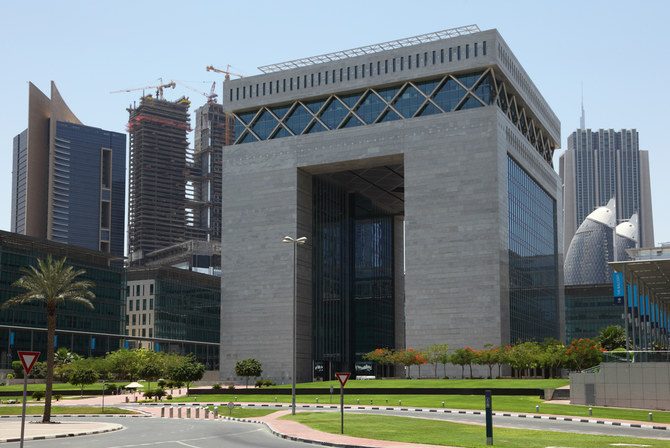
RIYADH: Dubai International Financial Centre recorded its highest gross written premiums in its 20-year history, amounting to $2.6 billion in 2023, marking a 23 percent increase from the previous year.
DIFC, a global financial center in the Middle East, Africa, and South Asia region, connects the fast-growing markets of the region with global economies and offers dining, retail, and living amenities, according to its website.
The center also recorded a 20 percent increase in the registration of insurance and reinsurance firms, including the first move of a Guernsey-based captive.
The Emirates News Agency reported that DIFC “has consolidated its position as the principal hub for the (re)insurance industry,” adding that DIFC’s appeal for managing general agents, representing 43 percent of new registrations, is a major factor shaping its insurance landscape.
This is credited to the center’s well-established regulatory framework, facilitating partnerships with cedants and brokers.
The influx of global insurers, reinsurers, and brokers, as well as captives, MGAs, and other industry stakeholders into DIFC, is driven by several factors. These include buoyant oil prices and increased infrastructure spending, as well as a focus on sustainable projects and low insurance penetration in the region.
Among the notable entities to join DIFC’s insurance sector in the past year are Alif Limited, Arc Insurance and Reinsurance Limited, and Barents Risk Management Limited. Joining them are BharatRe Global Ltd. and many more, it added.
Arif Amiri, CEO of DIFC Authority, emphasized the center’s role as a global industry hub, hosting over 120 registered insurers, reinsurers, captives, MGAs, and related entities.
The significance of DIFC’s stature in the insurance domain is further underscored by its co-hosting of the Dubai World Insurance Congress, featuring discussions on key themes reshaping the industry’s future, including innovation, capital attraction, and talent development.
In 2023, a survey conducted at DWIC revealed an 87 percent confidence in the Middle East, Africa, and Southern Asia market’s strategic opportunities. Property, health, energy, cyber, and liability lines of business were identified as holding the most potential. The survey also highlighted an 85 percent confidence rate in renewals and client retention.
Over two decades, DIFC has fostered the growth of the insurance and reinsurance industry, attracting talent and expertise to access key markets in the Middle East, Asia, and Africa.
The center hosts major insurance brokers, five of which are top ranked by the specialized insurance credit rating agency, AM Best. This has contributed to a significant 61 percent increase in brokered premiums compared to 2022, surpassing the $2 billion mark and solidifying DIFC’s position as a global market for insurance and reinsurance placements.
Dubai Real Estate Brokers Program attracts 25 strategic partnerships
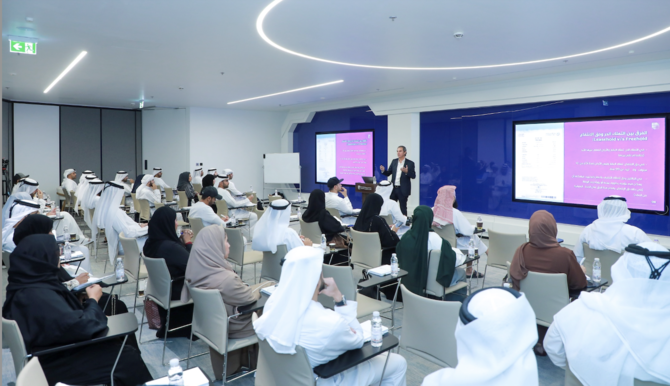
RIYADH: Dubai’s property market is set to grow, with the Real Estate Brokers Program securing 25 partnerships with brokerage companies and developers in the private sector.
According to a press statement, the first phase of the program, launched in mid-March and headed by the Dubai Land Department, also received over 1,000 registrations from Emirati citizens.
Dubai Real Estate Brokers Program aims to increase the proportion of citizen brokers from 5 percent to 15 percent over the next three years to enhance the participation of young citizens in the Emirate’s developmental initiatives across various key sectors.
“This reflects the early positive impact of the program, showcasing citizens’ aspirations and eagerness to engage as real estate brokers and acknowledging the pivotal role of Dubai’s real estate sector locally and globally,” said Marwan bin Ghalita, acting director general of Dubai Land Department.
The initiative also aligns with Dubai Social Agenda 33, which seeks to triple the number of Emiratis working in the private sector.
Ghalita added that the program will help young talents in the nation enhance their productivity, therefore contributing to Dubai’s economic growth.
“Dubai consistently offers outstanding examples of collaboration and synergy between the private and public sectors,” said Ghalita.
He added: “With the program’s enrollment exceeding 1,000 citizens and real estate companies continuing to join the strategic alliance within a short period, we are diligently working toward achieving all the ambitious goals of the Dubai Real Estate Brokers Programme. In particular, Emirati real estate brokers will increase from 5 percent to 15 percent over the next three years.”
The program also encompasses additional initiatives, including Emirati real estate broker licensing, encouraging property developers to allocate a portion of their sales to local agents, and empowering citizens in the property sector.
Under the partnership with the private sector, citizen participants will receive various support packages to enhance the competitive edge of UAE people and enable them to take up roles in the real estate sector.
The press statement added that efforts would also be made to allocate 10 percent to 15 percent of the development company’s sales to be marketed by Emirati real estate brokers, therefore contributing to the empowerment of national citizens by offering them employment opportunities in the property market.
Dubai ruler approves new $35bn airport terminal
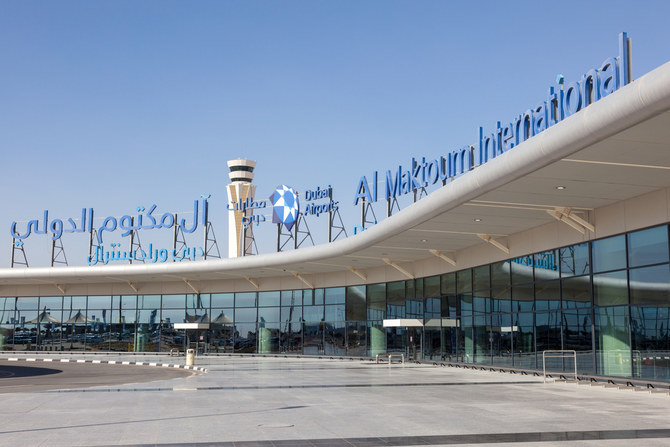
CAIRO: Dubai’s ruler Sheikh Mohammed bin Rashid Al-Maktoum approved a new passenger terminal in Al Maktoum International airport worth 128 billion dirhams ($34.85 billion), he said on Sunday in a post on X.
The Al Maktoum International Airport will be the largest in the world with a capacity of up to 260 million passengers, and five times the size of Dubai International Airport, he added, saying that all operations at Dubai airport would be transferred to Al Maktoum in the coming years.
The Al Maktoum airport will also include 400 terminal gates and five runways, he said.
The airport will be the new home of flagship carrier Emirates and its sister low-cost airline Flydubai along with all airline partners connecting the world to and from Dubai, Dubai state-owned airline Emirates chairman Sheikh Ahmed bin Saeed Al-Maktoum said.
The move “further solidifies Dubai’s position as a leading aviation hub on the world stage,” the CEO of Dubai Airports, Paul Griffiths, was quoted as saying by the Dubai Media Office.
Oil Updates – prices fall 1% on Israel-Hamas ceasefire talks, US inflation concerns
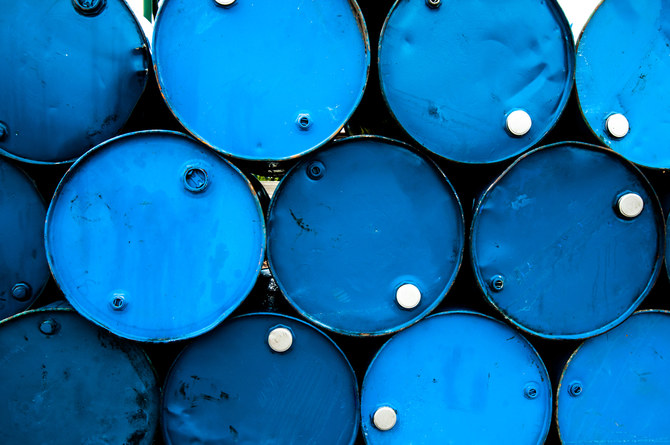
BEIJING/NEW DELHI: Oil prices were down 1 percent on Monday, erasing gains from Friday as Israel-Hamas peace talks in Cairo eased fears of a wider conflict in the Middle East and US inflation data further dimmed the prospects of interest rate cuts anytime soon, according to Reuters.
Brent crude futures fell by as much as 98 cents, or 1.09 percent, to $88.52 a barrel by 9:44 a.m. Saudi time. West Texas Intermediate futures were down 83 cents, or 0.99 percent, at $83.02 a barrel.
Stepped-up efforts to mediate a ceasefire between Israel and Hamas moderated geopolitical tensions and contributed to the weak opening on Monday, IG market analyst Tony Sycamore said. A Hamas delegation will visit Cairo on Monday for peace talks, a Hamas official told Reuters.
Israel’s foreign minister said on Saturday a planned incursion into Rafah, where more than one million displaced Palestinians are sheltering, could be put off in the event of a deal that involves the release of Israeli hostages.
A White House spokesperson said Israel had agreed to listen to US concerns about the humanitarian effects of the potential invasion.
Markets are also on watch for the US Federal Reserve’s May 1 policy review.
“Also playing a part are some nerves ahead of this week’s Federal Open Market Committee meeting which is expected to come with a more hawkish tone,” Sycamore said.
US inflation rose 2.7 percent in the 12 months through March, data on Friday showed, above the Fed’s target of 2 percent. Lower inflation would have increased the likelihood of interest rate cuts, which would stimulate economic growth and oil demand.
“The sticky US inflation sparks concerns for ‘higher-for-longer’ interest rates,” leading to a stronger US dollar and putting pressure on commodity prices, independent market analyst Tina Teng said.
The dollar strengthened on the prospect of higher-for-longer interest rates. A stronger dollar makes oil more expensive for those holding other currencies.
Further weighing on the outlook for oil demand, China’s industrial profit growth slowed down in March, official data showed on Saturday, in the latest sign of frail domestic demand in the world’s second largest economy.
Cumulative profits of China’s industrial firms rose 4.3 percent to 1.5 trillion yuan ($207 billion) in the first quarter from a year earlier, compared to a 10.2 percent rise in the first two months.
But oil prices could swing higher again if US inventory data and China’s PMI index show improvements this week, Teng said.
Brent had settled up 49 cents and WTI up 28 cents on Friday on concerns about disruptions to supply from events in the Middle East.
The market brushed aside potential supply disruptions stemming from Ukranian drone strikes on the Ilsky and Slavyansk oil refineries in Russia’s Krasnodar region over the weekend. The Slavyansk refinery had to suspend some operations after the attack, a plant executive said.


